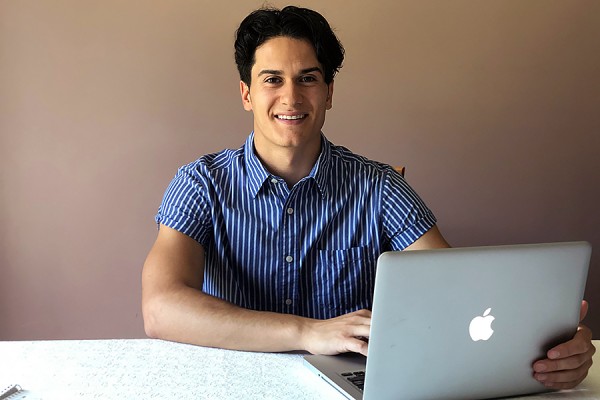 Ryan Palazzolo’s project will help researchers spread the word about their work. He is one of 107 UWindsor students who have received research internship grants.
Ryan Palazzolo’s project will help researchers spread the word about their work. He is one of 107 UWindsor students who have received research internship grants.
A UWindsor student is designing a toolkit to help health researchers disseminate information about their work.
Ryan Palazzolo is working on knowledge translation, creating messaging that simplifies information to match the expertise of its target audience. His project will help researchers apply for grants, communicate with other experts, or explain their work to the general public.
“One of the most important things that you have to consider is how do you tailor your information for a diverse audience,” said Palazzolo, a recent graduate from the health and biomedical sciences program who is now taking additional courses in preparation for medical school.
An additional goal of the research is to create a network of students who can form a knowledge translation team experienced in organizing outreach events and putting out educational information about local health research.
Palazzolo’s research is being funded by the University. He is one of 107 UWindsor students receiving $6,000 grants as part of $642,000 in overall funding for research internships.
UWindsor is contributing an unprecedented $471,000 toward these research opportunities. The grants are going to undergraduate and graduate students from Canada and abroad, and are across all disciplines, said K.W. Michael Siu, UWindsor’s vice-president, research and innovation.
“The COVID-19 pandemic has affected research internships for students everywhere,” said Dr. Siu. “At the University of Windsor, we are trying to make sure our students continue to have exceptional research opportunities despite the current circumstances.”
The project is the first of its kind at the University of Windsor, said Dora Cavallo-Medved, the biomedical sciences professor who is supervising it.
Pointing to the recent spate of grants for local COVID-related research through the WE-Spark Health Institute, a research partnership involving the University of Windsor, Windsor Regional Hospital, Hotel-Dieu Grace Healthcare, and St. Clair College, Dr. Cavallo-Medved said the project fills a need.
“It is apparent that health research teams require support to develop and implement knowledge translation plans to deliver the latest research findings to both the academic and clinical communities, as well as the general public,” she said.
Palazzo is building on volunteer work he has done in public outreach with the Windsor Cancer Research Group. The Windsor native said he hopes other students will be able to pick up where he leaves off.
“There’s not a lot of formal training in this in the sciences,” Palazzolo said. “It’s critical for funding and for community engagement.”
—Sarah Sacheli
